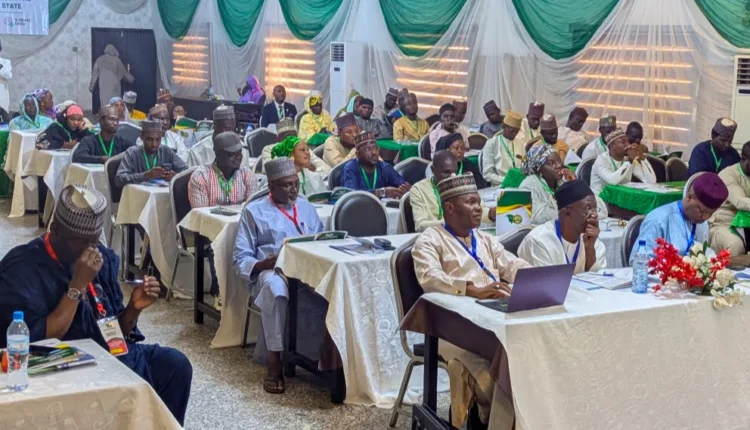Yobe govt trains 100 journalists on data analysis, risk journalism
Yobe govt trains 100 journalists on data analysis, risk journalism
The Yobe Government has organised a three-day workshop to train 100 journalists on data analysis, risk management and other new trends in journalism.
The workshop is themed “The Nigeria Union of Journalists (NUJ), Democratic Governance and Contemporary Issues in the Development of Yobe State.”
Speaking at the inauguration of the training in Kano on Monday, Alhaji Abdullahi Bego, Yobe Commissioner for Home Affairs, Information and Culture, noted that data analysis and risk communication were inevitable in journalism.
Bego said the media landscape was undergoing rapid transformation, especially with the rise of artificial intelligence, and urged journalists to adapt to new trends in order to remain relevant.
“Any journalist that sticks to the journalism of 20 or 30 years ago will find it difficult to cope with the emerging transformation in the sector.
“That is why this training is crucial, as it provides an opportunity for NUJ members to broaden their understanding and upgrade their skills,’’ he said.
The commissioner explained that Gov. Mai Mala Buni’s administration had recorded remarkable achievements across critical sectors of development, including education, healthcare, empowerment, and media engagement.
In the media and information sector, Bego said the government had supported the NUJ, trained information and PR officers, renovated Yobe Broadcasting Corporation (YBC) studios, upgraded its transmission capacity, and converted casual staff to permanent and pensionable employees.
He added that the government was providing 24-hour online transmission of YBC programmes and planned to establish a new state television station to replace antiquated YTV facilities.
On education, he said the administration had constructed new schools, rehabilitated existing ones, improved teaching and learning resources, recruited teachers in large numbers, and sustained student feeding programmes.
According to him, over 40,000 students have benefited from scholarships and the regular payment of examination fees.
Bego said the Buni administration also prioritised healthcare, with objectives anchored on accessibility, quality, and affordability.
He said a 370-bed capacity hospital was built, kidney dialysis provided free, and research on kidney diseases initiated.
He added that 143 new Primary Healthcare Centres (PHCs) had been built or rehabilitated across the state, with more than 2,000 medical personnel recruited.
Read Also: Sule reappoints Wandai, NASIEC chairman
He also listed free antenatal care and free treatment for children under five years as part of the administration’s health interventions.
“The state received a USD500,000 award for excellence in primary healthcare services in the North-East sub-region,’’ he noted.
On empowerment, Bego said the administration distributed vehicles, tricycles, motorcycles, sewing and embroidery machines, vulcanising machines and barbershop tools to beneficiaries.
He added that billions of naira worth of agricultural implements and fertilisers had been given to farmers, with youths and women as the major beneficiaries.
The commissioner stressed that the administration ensured equitable distribution of projects, including roads, markets, sesame processing hubs and hospitals to all parts of the state.
Bego described the Buni administration as the most youth-friendly and inclusive in the history of the state, noting that its policies had strengthened democracy and good governance.
A resource person, Dr Kole Shetima, Honorary Special Advisor, Policy, to Gov. Buni, noted that journalism was not just about reporting events, but also about multi-platform story telling, safety consciousness and ethical resilience.
He advised the journalists to invest heavily on self development to increase their values and influence.

